Save the Pangolins
A MONTH FOR PANGOLINS!
In March 2024, we’ve chosen to focus our efforts on supporting these magnificent mammals who are still facing threats from human activities.
Our mission was and still is to gather donations for the pangolins under the care of Save Vietnam’s Wildlife (SVW) rescue center. These contributions will directly assist in covering the pangolins’ essential needs such as food, medical care, and management expenses.
It’s crucial to note that a portion of all donations will be retained by WSF to cover the costs associated with launching and managing this initiative.
Results
In March 2024, we had the opportunity to visit Save the Vietnam’s Wildlife rescue centre. Alongside 10 donors, our group, led by our naturalist and Head of conservation projects Mario Passoni, set out on a trip organized by the travel agency Scuba Cruise. During our tour, we participated in volunteer activities at the centre and got to know the local staff and the resident animals, including the pangolins Sunny and Ant.
In total, we collected enough donations to provide Sunny and Ant with 1 month of fresh food and support their welfare (enclosure maintenance and enrichment activities, vet costs, etc.).
Donors received a symbolic donation certificate from Sunny and Ant.
We thank all SVW staff for their hospitality and professionalism.
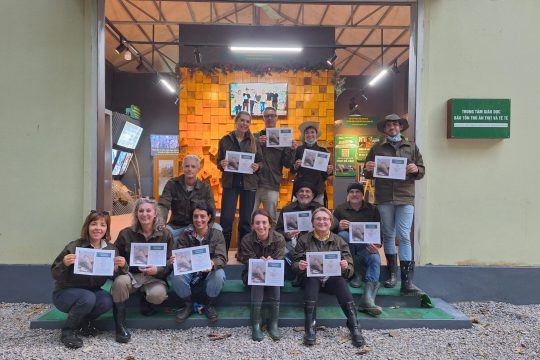
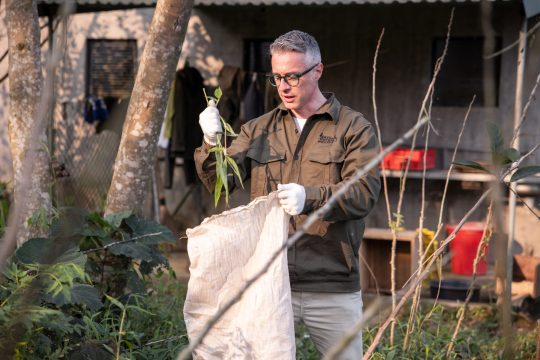
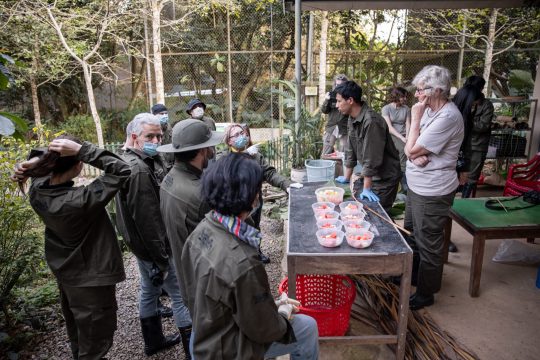
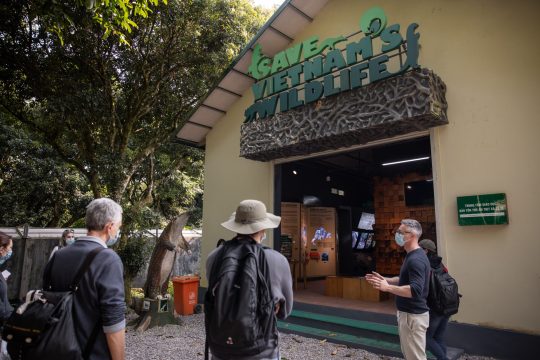
Photo credits: Selina Mao
How can you help?
You can still help us support the pangolins at the rescue centre!
We have created the following donation options for you:
| Donation | How we use your donation | Your reward |
| Free donation | Your donation will be used to generally support the pangolins of the centre. | You will receive a thank you e-mail. |
| 10 euros | It will be used to buy fresh food for the pangolins at the SVW rescue center. | You will receive a thank you e-mail and a HD photo of a pangolin, directly from the rescue centre. |
| 20 euros | It will be used to support the medical expenses of the pangolins staying at the SVW rescue center. | You will receive a thank you e-mail and a HD photo of a pangolin, directly from the rescue centre, and the pangolin information pamphlet. |
| 70 euros | It will be used to cover expenses for fresh food, veterinary supplies, enclosure maintenance, and environmental enrichment at the SVW rescue center. | You will receive a thank you e-mail and a HD photo of a pangolin, directly from the rescue centre, and the pangolin information pamphlet, a symbolic adoption certificate, and the Animal Stories Book. |
| Donation | How we use your donation | Your reward |
| Free donation | Your donation will be used to generally support the pangolins of the centre. | You will receive a thank you e-mail. |
| 10 euros | It will be used to buy fresh food for the pangolins at the SVW rescue center. | You will receive a thank you e-mail and a HD photo of a pangolin, directly from the rescue centre. |
| 20 euros | It will be used to support the medical expenses of the pangolins staying at the SVW rescue center. | You will receive a thank you e-mail and a HD photo of a pangolin, directly from the rescue centre, and the pangolin information pamphlet. |
| 70 euros | It will be used to cover expenses for fresh food, veterinary supplies, enclosure maintenance, and environmental enrichment at the SVW rescue center. | You will receive a thank you e-mail and a HD photo of a pangolin, directly from the rescue centre, and the pangolin information pamphlet, a symbolic adoption certificate, and the Animal Stories Book. |
Click here to donate now!
Don’t forget to select the amount of your donation based on the three suggestions we have made and write in the message below: Pangolin!
You are however free to make a Free donation, which will be used to generically support the pangolins hosted at Save Vietnam’s Wildlife rescue centre.
Once you have donated, email us on info@worldsustainabilityfoundation.org to get your reward and share with us why you have donated.
And don’t forget to share this initiative on your social networks, with your colleagues and friends! 😉
Note: this fundraising initiative is for Individuals, but in case you are a company and you would like to contribute, Email Mario Passoni at info@worldsustainabilityfoundation.org
Keep scrolling for more information on pangolins.
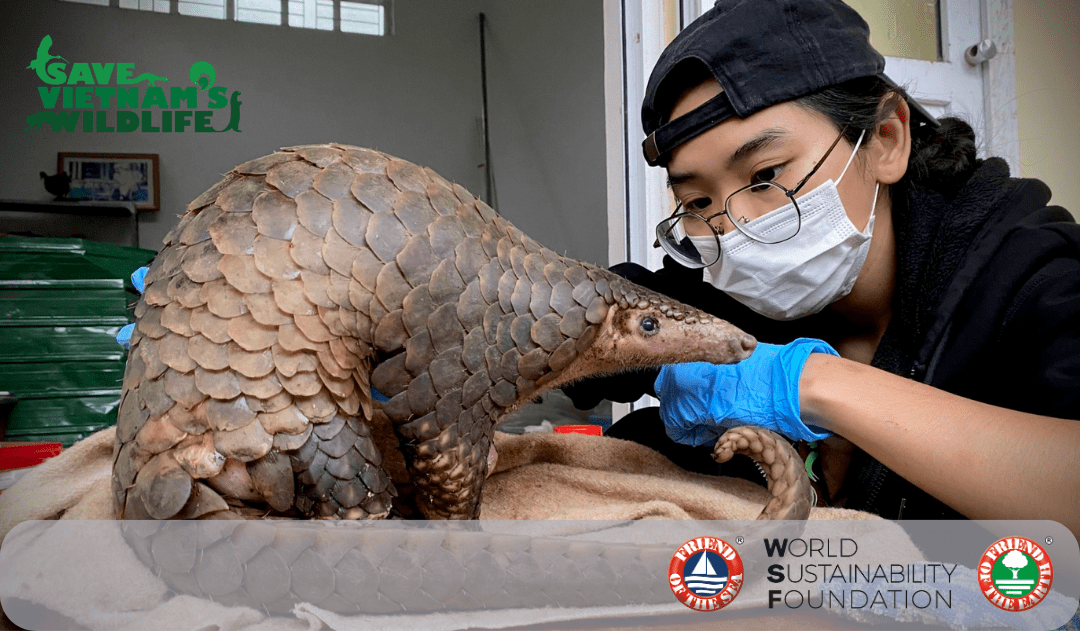
The problem
The only mammals on earth to be covered with scales, pangolins are renowned for their unique anatomy. Unfortunately, pangolin meat is also considered to be a delicacy in China and Vietnam and their scales are widely traded for use in traditional Asian medicine – where they are believed to yield medicinal properties that can cure a variety of ailments.
This monetary incentive has led to innumerable pangolins being taken from the wild, even though it is illegal to poach them, and sold on the black market. The IUCN SSC Specialist Pangolin Group estimates that, despite the reduction in numbers over the past decades, a pangolin is illegally taken from the wild every five minutes.
It is thought that international legislation is not sufficient to protect pangolins because the laws have not been enforced. This is, in part, due to a lack of political will and a lack of funds. Local populations are also not aware or engaged in the drive to conserve these unique animals.
Though poaching is the main threat to these species, habitat loss is also negatively impacting populations in both Asia and Africa, mainly because of deforestation.
Environmental consequences
The pangolin is believed to be the world’s most trafficked mammal. There are eight species of pangolin – four from Africa and four from Asia – all of which are listed by the IUCN as threatened with extinction.
Of the eight species of pangolin:
Three are listed as critically endangered: Chinese pangolin (M. pentadactyla), Sunda pangolin (M. javanica) and Philippine pangolin (M. culionensis)
Three are listed as endangered: White-bellied (P. tricuspis), Giant (Smutsia gigantea), Indian (Manis crassicaudata)
Two are listed as vulnerable: Black-bellied (Phataginus tetradactyla) and Temminck’s pangolin (S. temminckii)
Pangolins have a highly specialized diet, relying on ants and termites for their nutrition. Though they are not closely related to anteaters, pangolins occupy a similar ecological niche to these animals. They are important for controlling insect populations; it has been reported that a single pangolin can eat upwards of 70 million insects a year. As such, pangolins have an important role in the control of forest termites and without them, the balance of their delicate ecosystems will tip.
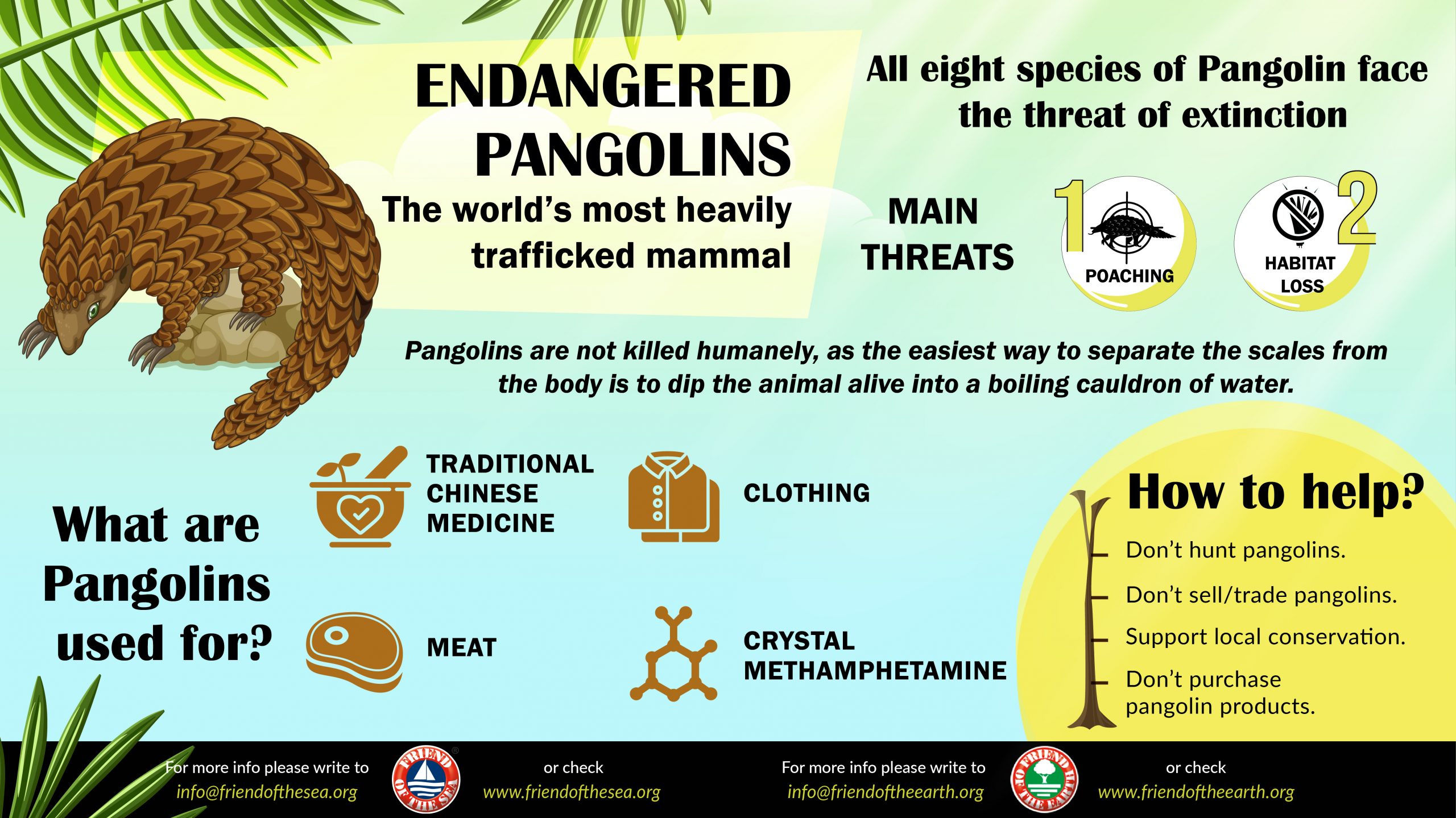
Possible Solutions
In recent years, pangolins have become a symbol of conservation. These unique, characterful animals have grown famous globally for their unusual looks and worthy plea; more resources and attention are being devoted to their conservation.
Conservation organizations are working to improve our understanding of the pangolin’s ecology and behavior. Pangolins are elusive mammals that wander their habitats alone, mostly at night. They have proven difficult to study but renewed efforts are underway to identify the distribution and ranges of pangolin populations, as well as how their ecosystems can be manipulated to ensure their survival in the wild. Surveys are underway to work out how many pangolins there are in the wild.
Elsewhere, educational initiatives are raising awareness about pangolin conservation amongst local communities and rangers are being trained to help crack down on poaching in high-risk areas. Though the main aim is to stop pangolins from being taken from the wild in the first place, it is also important that rescue centers are given the training and resources necessary to rehabilitate live pangolins that have been seized from illegal traders.
WSF Activities and initiatives
The World Sustainability Foundation project provides financial support for Save Vietnam’s Wildlife, a national non-profit organization in Vietnam that was founded on the critical need for more effective solutions to secure a future for Vietnamese wildlife, with special regard to pangolins.
In Vietnam each year, thousands of animals are illegally traded for meat consumption, traditional medicine, pets, and souvenirs. The majority of live animals trafficked, are often dehydrated, nutritionally-stressed, carrying diseases, or have suffered injuries from being trapped and hunted.
Save Vietnam’s Wildlife’s rescue work aims to reduce these threats, by directly targeting known areas of threat to wild populations. We use our media coverage of rescues and releases, to help educate the public, and raise awareness of the impacts of the illegal wildlife trade.
By raising funds and awareness, we are helping Save Vietnam’s Wildlife to feed 9 pangolins in their rescue and rehabilitation center for a month.
Instagram: @svw.vn
Call to action
Help to halt the dramatic decline of these unique mammals by sharing their story.
Use social media to tell the world that it is not OK to consume pangolin meat – these animals need our help.
Sign Friend of the Earth petition to ask pharmaceutical companies to stop trading pangolin’s parts.
Make a donation to support pangolins and raise awareness.











